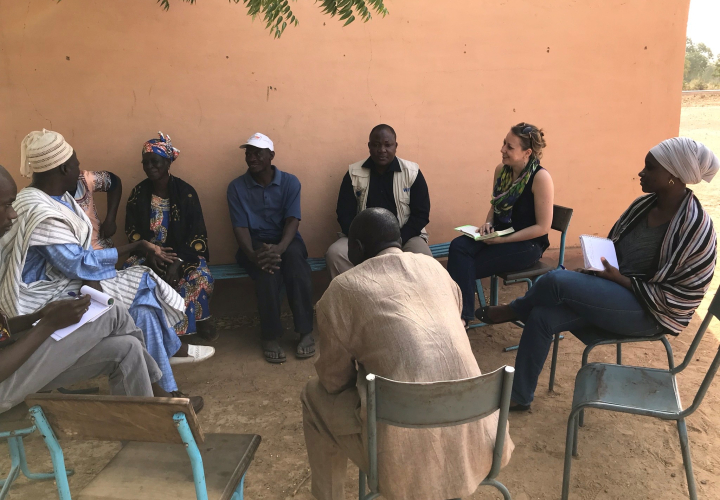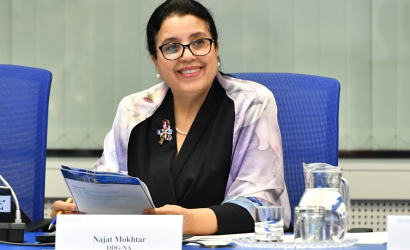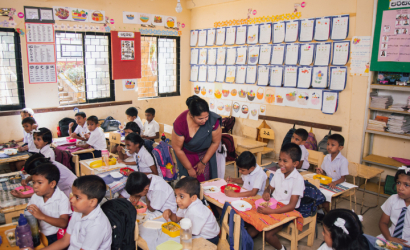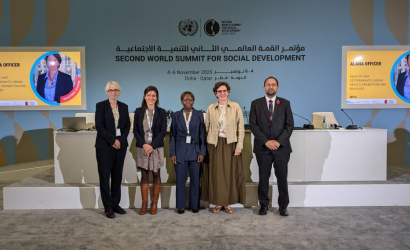If you have worked on nutrition in West Africa in the last 20 years, chances are you have met Anna Horner and seen her in action. Anna took up duties as the new UN-Nutrition Senior Coordinator in mid-January after a competitive selection process, involving the UN-Nutrition Steering Committee.
A Public Health Nutritionist, Anna Horner has held a variety of nutrition positions at country, regional and global levels, including at the World Food Programme (WFP), where most recently, she served as the Chief of Strategic Partnership Engagement for the Nutrition team at headquarters. Prior to that, she was a long-serving Regional Nutrition Advisor for West Africa with WFP. She has also worked in several countries in the region, including at the United Nations Children’s Fund in Guinea and Mali, in addition to carrying out other country-level assignments, such as the emergency response to the 2010 earthquake in Haiti.
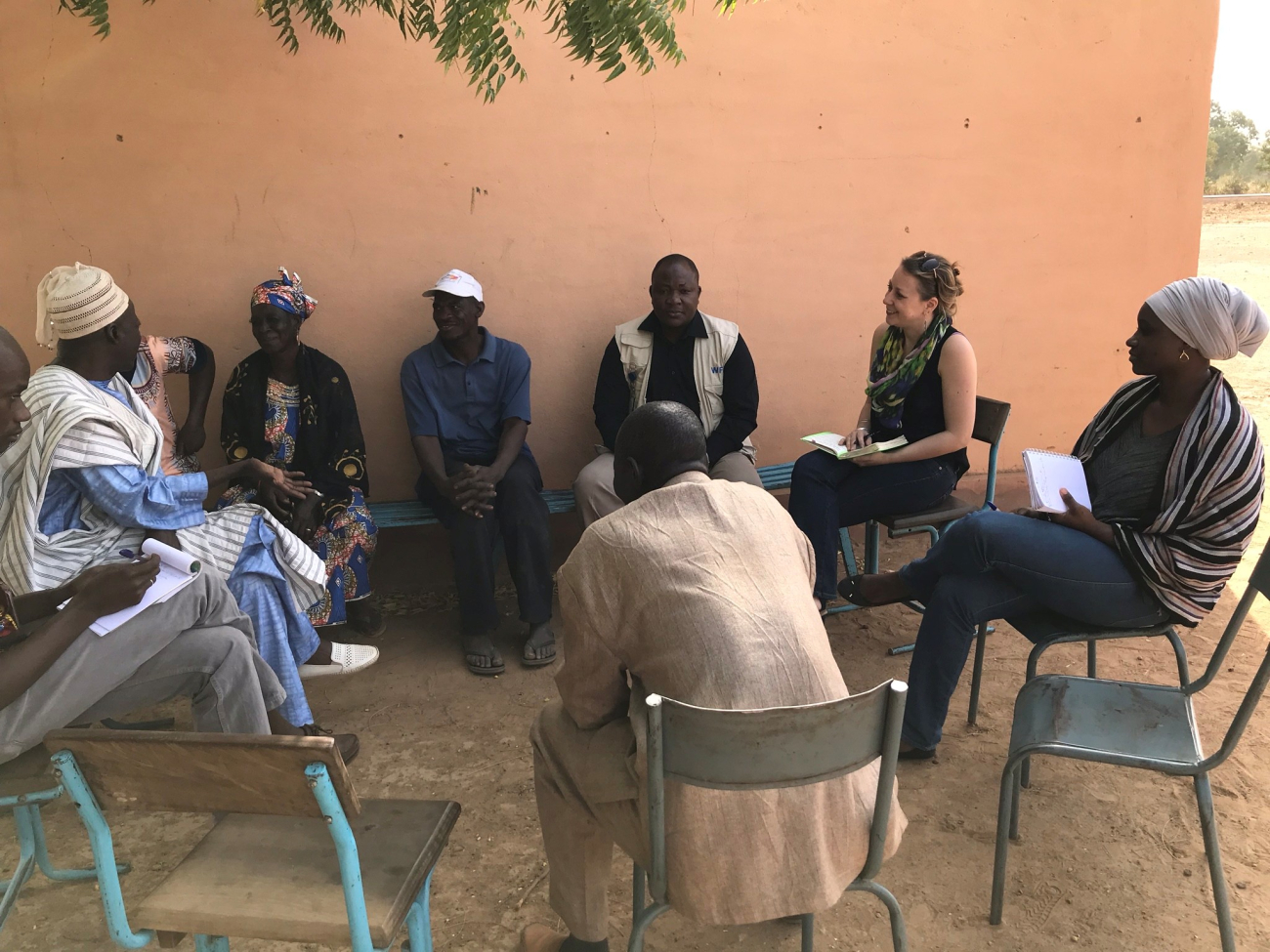
This interview explores the person behind the name, providing a glimpse at her future aspirations, reflections as a seasoned nutritionist and partnership specialist along with some other tidbits you may not have known about her.
Q1: What is your favourite food and how do you eat it?
Anna: That’s a hard question as there are so many contenders, but I think my ultimate favorite would be a bowl of fruit, any and all fresh fruit. Not only do I love fruit, but it also reminds me of when I was a child and my father would always prepare and share bowls of fresh fruit with us every night after dinner, so it has very sentimental associations for me. Even now, when I go back to my parents' house, this habit remains.
Q2: What prompted you to apply to the UN-Nutrition Senior Coordinator position?
Anna: I applied to this position because I saw it as a very interesting opportunity to do something which I believe is key in the work we do:
- bring together the work of many different actors (in this case UN) to coordinate and collaborate;
- look for greater synergies, efficiencies, and gaps to be covered; and
- amplify our voices by joining forces.
To me, this is a critical part of working in such a complex field, ensuring that we are pulling everyone’s work together and speaking and acting as one where possible.
Q3: How did you first get involved in nutrition?
Anna: Although I have always loved food and cooking, my professional focus on nutrition came about in a rather indirect manner. I studied international development and started my career working in more generalist field-based positions, one of which was with the World Food Programme in Niger in 2003. At that time, I started working on nutrition to fill a gap as it was a very small office and did not have specialized staff in nutrition. From there, I gained a lot of experience working in nutrition, including during the 2005 crisis, and decided to go back to university to study Public Health Nutrition to provide myself with a solid technical background, before coming back to various UN positions working on nutrition in the West Africa region. My path to nutrition was random but fortuitous, as I believe strongly in improved nutrition as a key cornerstone of human health and development all around the world.
Q4: What fascinates you most about nutrition or about your nutrition work?
Anna: I am most fascinated by the complexity and nuances of nutrition. This is why, even after more than 20 years in the field, I still find it exciting. Nutrition is an extremely multi-causal issue, linking into so many areas of human existence, including human health, food security, water, socio-cultural practices, economic realities, gender dynamics, climate, markets, etc. Improving nutrition globally requires action on so many fronts; it is a true challenge. At the same time, it’s something very personal, disproportionately affecting the most vulnerable groups such as women, young children, adolescent girls, the elderly, etc. and so closely linked to culture. I find this both extremely motivating with nutrition’s ability to change lives and fascinating in its universality, and yet very specific embedding in culture.
Q5: With more than 20 years of experience working in nutrition within the UN system, tell us your favourite story of UN coordination on nutrition at country/regional level.
Anna: There have been so many stories – thankfully more good than bad – but I would say that my first big exposure to UN collaboration probably marked me the most throughout my career: the 2005 food and nutrition crisis in Niger. At the time, I was working with WFP, and we collaborated with a number of other agencies – most closely UNICEF on nutrition, but also FAO [the Food and Agriculture Organization of the United Nations], WHO [the World Health Organization], and UNFPA [the United Nations Population Fund]. When the crisis hit, we found ourselves in a true emergency, where people were working around the clock. The situation was deteriorating rapidly, the international media was very present, a lot of new actors were arriving every day, and the pressure was extreme. I watched the UN nutrition actors start to work a bit in an individual and self-interested manner, each focused on their own objectives, but very quickly I think there was a real understanding that we were all in it together and shared the same objectives and needed to align. Our ability to really pull together and focus on jointly solving the problem the country was facing as best we all could all together remains an example and a source of pride for me today.
Q6: If you had a magic wand and could make one strategic change in nutrition within the United Nations, what would that be?
Anna: I think I would use that magic wand to make sure that we are building a strong feeling of being one team for nutrition across all agencies. We have a massive joint objective we are all working towards and our collaboration will be weakened without sufficient trust and a strong feeling of joint purpose. I think that it is important to continue at all levels to nurture that trust, mutual understanding and sense of being one team to have the impact of eliminating malnutrition globally.
Q7: Tell us something you do at home to foster good nutrition within your family.
Anna: I have two young daughters, and I try to foster good nutritional habits in them. I believe very strongly in eating as a family and the importance of making both preparing and consuming a nutritious meal, something which they see as a pleasurable family moment. I try to diversify their food and ensure that they eat mainly healthy, local and seasonal foods where possible, but also try to ensure that they see the fun and joy in food and sharing that moment together with family and friends.
Click here to view her brief biography.
